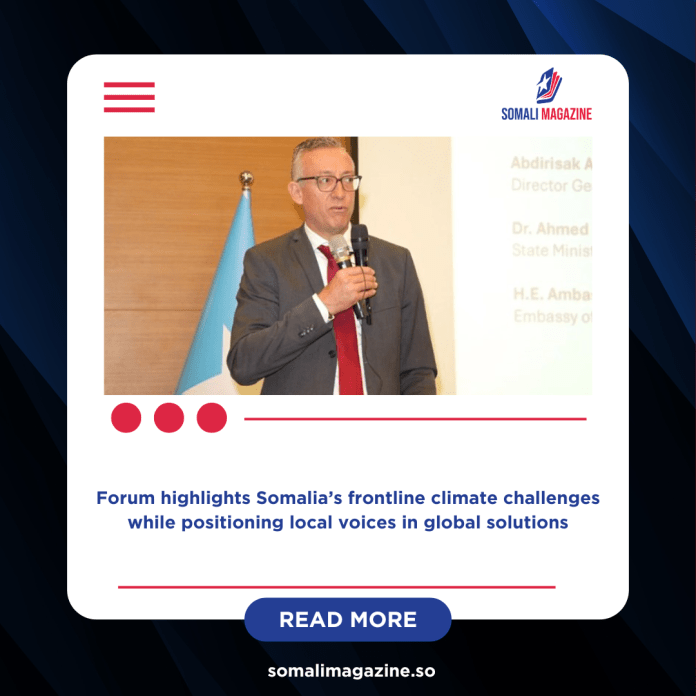Facebook Twitter (X) Instagram Somali Magazine - People's Magazine
In a city long defined by conflict and instability, Mogadishu hosted an event last week that carried a very different message, one that connected the fight against climate change with the pursuit of peace.
The Somali capital staged the inaugural Mogadishu Climate Talk, organized by the German Embassy in Somalia in partnership with the Somali Ministry of Environment and Climate Change and the Berghof Foundation. The forum gathered government officials, civil society leaders, and international partners to explore how climate change is reshaping Somalia’s security and stability.
“This is not just a climate conference, it is a peace dialogue,” German Ambassador Sebastian Groth said in his opening remarks. He stressed that holding the talks in Mogadishu was significant since climate impacts are not distant forecasts here but daily struggles for communities.
Unlike many international gatherings that are usually held in cities like Nairobi or Addis Ababa, this event was intentionally rooted in Somalia itself. Organizers wanted to make sure Somali voices and local experiences guided the discussions, ensuring that the global climate agenda recognizes realities on the ground.
Somalia may contribute little to global greenhouse gas emissions, but it is one of the countries most vulnerable to climate change. With more than 80 percent of Somalis depending on farming and pastoralism, the country faces recurring droughts, floods, and rising temperatures that threaten survival and increase tensions. These pressures often drive displacement, fuel land disputes, and worsen already fragile social and political conditions.
“Climate change in Somalia is a threat multiplier,” Ambassador Groth emphasized. “But it also creates an opportunity to build resilience through cooperation.”
Panel discussions highlighted how climate adaptation could help strengthen peace by reducing competition over resources and building trust in institutions. Participants argued that environmental solutions should not only focus on protecting livelihoods but also contribute to reconciliation and stability.
Despite ongoing political challenges, Somalia has made progress in shaping climate policies. The country has updated its Nationally Determined Contributions, developed a national adaptation plan, and secured greater access to the Green Climate Fund. These steps, according to Groth, show the determination of Somali institutions to confront the crisis and demonstrate how environmental policy can serve as a rare space for collaboration across Somalia’s fragmented political landscape.
The Berghof Foundation, known for its peacebuilding work in Somalia, played a central role in making the forum inclusive. Women, youth, and community leaders were actively involved, sharing firsthand experiences of how climate pressures are affecting their lives. “Peacebuilding and climate resilience must go hand in hand,” one youth participant said. “Our communities are ready to lead, we just need the tools and trust to do so.”
The event also connected Somalia’s experiences to the global stage ahead of the COP30 summit in Brazil, reminding participants that lessons from frontline countries like Somalia are essential to shaping meaningful international climate action.
For many who attended, the Mogadishu Climate Talk was more than a discussion, it was a symbol of resilience and a sign of hope. It marked the beginning of what organizers hope will become a sustained platform for dialogue, one that positions Somalia not just as a country in need of assistance but as a contributor to global solutions.
In his closing remarks, Ambassador Groth captured this sentiment. “It is our hope that this is the beginning of a dialogue that continues to bridge the climate peace divide and helps Somalia build a more sustainable and peaceful future.”
The gathering ended with a sense that Mogadishu, long seen only through the lens of conflict, is ready to take on a new role, where climate action and peacebuilding move forward together.

